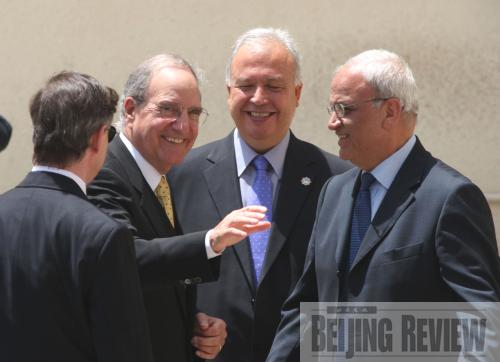|
 |
|
TRIP OF MEDIATION: U.S. Middle East peace envoy George Mitchell (second left) arrives at the Palestinian National Authority's presidential compound in Ramallah on June 10 (HUA CHUNYU) |
U.S. President Barack Obama started to implement his new Middle East policy soon after he assumed office. He paid a state visit to Turkey, dispatched Secretary of State Hillary Clinton to the Middle East, appointed distinguished diplomat George Mitchell as his special envoy to the Middle East, and on June 4 gave a speech at Egypt's Cairo University stating his intention to mend relations with Islamic countries. These diplomatic activities not only served a clear goal, but also were orderly in design, which primarily showed the flexible art of "smart power."
 |
|
SPEECH OF GOODWILL: U.S. President Barack Obama gives a speech at Egypt's Cairo University on June 4, stating his intention to mend relations with Islamic countries (XINHUA) | Failed policies
The reason Obama is making such major changes to U.S. strategy in the Middle East is to bail the United States out of the Middle East swamp, as well as to maintain the country's strategic interests and reassert its supreme position in the region.
It is well known that the Middle East has ample gas and oil resources, and is of geopolitical and strategic importance. Here also are concentrated several U.S.-listed "failed states" and extremist forces that have long disrupted international affairs. Therefore, the region is closely linked to U.S. antiterrorism, non-proliferation of weapons of mass destruction and energy security policies.
George W. Bush launched two wars in the Middle East in the name of antiterrorism after the September 11 terrorist attacks in 2001. Then, Bush issued his Middle East policy known as the "Greater Middle East Initiative." According to the initiative, the United States would pursue democratic reform in moderate Arab countries, including its old allies. Palestine was also included in the reform framework, while the United States showed a clearer bias in favor of Israel. The tough Bush style left nothing but a mess in the region. Iraq is now in long-term turmoil, the Iranian nuclear issue is no closer to a solution, and the Israeli-Palestinian conflict has become even more complicated. With all these problems combined, an anti-
U.S. tendency is growing in the Middle East. Bush's Middle East policy did not benefit any country or region there, but greatly damaged U.S. interests in the region and even its global interests.
Obama has completely changed the hard line of the Bush Doctrine. Instead, he frequently expresses American goodwill toward the Islamic world centered on the Middle East. In this way, Obama hopes to ease hostilities and make peace with countries there, and then reach the goal of mastering the region in U.S. hands once again.
A new approach
Obama's new Middle East policy is enlightened by a strong will to mend relations with the Islamic world. In his speech in Cairo, Obama praised the Islamic world's historical achievements and recognized Islamic culture as an important part of American society. He stressed that the United States and the Islamic world share the common values of justice, development and supreme human dignity, and that they have more common interests than differences. He discarded Bush's "New Crusade" theory and paid special attention to violent extremism in the Islamic world. Obama stressed that the Islamic world is also the victim of terrorism, and that Islam is a religion that also promotes peace.
| 